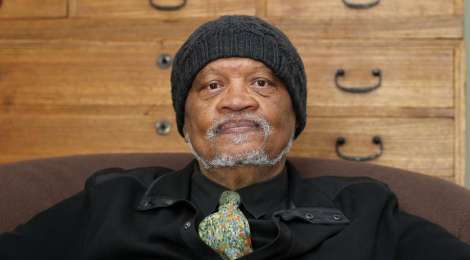
SFJazz Poetry Festival spotlights U.S. ethnicities
No one claims to have invented poetry. There is poetry in every people and in every language. Jazz, though, was made in America.
“Jazz, it seems to me, is less about the soloist – however talented – than it is about the complex interweaving of various sounds and voices,” says poet Jack Foley by e-mail. Foley is among those who will perform as part of the second annual SFJazz Poetry Festival, which begins Thursday and runs through Sunday.
“The late free jazz saxophonist Glenn Spearman thought of music as being like James Joyce‘s ‘Finnegans Wake,’ ” Foley says, “an expression of the constantly changing interpenetration of everything with everything.”
The festival, curated by SFJazz Poet Laureate Ishmael Reed, pairs poetry with jazz, and each evening is split into two shows spotlighting different ethnicities.
“All of the poets who’ve been chosen are members of ethnic groups which have been maligned in the media and Hollywood,” says Reed by e-mail. “It has been my experience that poets provide an alternative vision of ethnic life in the United States. Instead of go-betweens and translators, audiences will be able to listen to writers talk about their experiences firsthand.”
Thursday: The festival kicks off with Irish American Night, curated and hosted by Sean Casey and featuring poet Henry Flynn and Celtic music by Chris Waltz, and Italian American Night, curated and hosted by Lawrence DiStasi. Featured poets for the latter include Foley and his wife, Adelle, who perform chorally – speaking in varying degrees of simultaneity – along with Giovanna Capone, Sandra Gilbert and Tom Centolella.
Friday: Friday highlights Latino American Night, with San Francisco Poet Laureate Alejandro Murguía and Leticia Hernández-Linares among the performers, and Asian American Night, curated by Genny Lim.
“Poets like myself, heavily influenced by orature, oral tradition, blues and other contemporary genres like jazz or hip-hop, like to expand and blur the boundaries of conventional poetry and music,” says Lim, who will perform with Aimee Suzara and musician Ron Quesada. “But we often don’t get that opportunity and so jump at the chance to do something like this festival, which provides the right context and environment for some excitement to happen.”
Lim continues: “By fusing this ancient Filipino gong instrument (the kulintang) with modern electronic dance music, Ron has created a sound all his own that he calls ‘Kulintronica.’ “
They will be joined by the poet Pireeni Sundaralingam performing with her husband, Colm O’Riain, the Irish-born violinist and former concertmaster of the National Youth Orchestras of Ireland, and the poet Sean Manzano, who will play his kulintang with drummer Dillon Westbrook and bassist Robert Woodcock.
Saturday: Saturday begins with Native American Night, featuring curator Jennifer Foerster, Cedar Sigo and ethnomusicologist John-Carlos Perea on flute and electric bass, and is followed by Jewish American Night, curated by David Meltzer, who will perform with Marcia Falk, Jack Hirschman and Alan Kaufman.
Sunday: The closing night spotlights the LGBTQ and African American communities. “Like jazz musicians, LGBTQ and Two Spirit people are constantly improvising with structure as with styles of gender expression and modes of kinship,” says Indira Allegra, who hosts the evening’s first show and performs in the second. She has gathered Jewelle Gomez, Elena Rose, Amir Rabiyah and Sharon Bridgforth for the LGBTQ showcase.
Tennessee Reed hosts the festival’s closing show, African American Night, with poets Allegra, Samiat Salami, Vernon Keeve and Boadiba, who performs regularly with musical accompaniment throughout the Bay Area.
Casey, who’ll be featured Thursday night, says the festival is “a great opportunity for each ethnic group to step out of the great ‘Melting Pot’ for a moment and be able to shine as a community. … Each of these groups has a story to tell – a viewpoint to express – and the greater the number of poets that can be represented through their ethnic poetry, the better chance we all have to understand each other’s experience of being alive in America.”
IF YOU GO
SFJazz Poetry Festival: 7 and 8:30 p.m. Thursday-Saturday, 5:30 and 7 p.m. Sunday. $15. SFJazz Center, 201 Franklin St., S.F. (886) 920-5299.
This article originally appeared in The San Francisco Chronicle.
Photo by Brant Ward, The Chronicle

